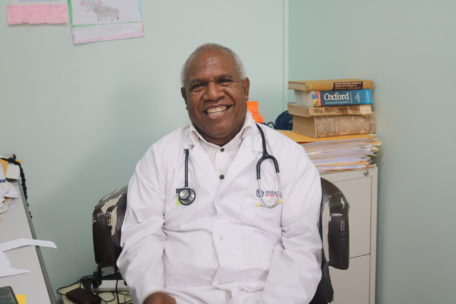Malaria, an infectious disease, that thrives in the tropics is one of the major causes of admissions and deaths in Papua New Guinea. The disease transmitted from one mosquito to another is endemic in PNG and the neighboring countries in the Pacific. Due to the region’s proximity to the equator, the transmission of the disease is influenced by altitude, marking the low coastal lowlands and islands as hotspots or areas of recurrent transmission. If left untreated, Malaria can become significantly severe causing brain damage or damage to vital organs that in some cases unfortunately lead to death.
To understand Malaria, Dr Polapoi Chalau explains what it is, how it is clinically presented, how can we can treat, complications if untreated and mainly what we need to do to prevent us from getting Malaria.
What is Malaria?
Malaria is a parasitic disease transmitted from person to person by the bite of infected mosquitoes. It begins as a flu-like illness, but if the illness not taken care of or treated properly, it can become severe.
How does Malaria spread and infect the body?
After the infected mosquito transmits the disease to a person through the bite, its take 10 – 14 days from onset for the illness to develop before any symptoms can show.
The Malaria parasite spreads through the blood in two forms; the adult form where the parasite travels in the blood, releasing harmful toxins and germs that grow to develop and cause all signs or symptoms or by depositing an egg in the liver, allowing it to grow and mature fully until it can travel in the body and release toxins as well causing the body and blood to get infected.
Signs and symptoms of Malaria
In the early 1960s and 1970s, the classical symptoms of Malaria were: fever, headache, vomiting, a cold sensation with shivers and shakes.
The symptoms have evolved since then, where people now experience abdominal pain, tummy aches, generalized body aches or feeling unwell, dizziness that can lead to people fainting, nausea and vomiting, diarrhea – these are also symptoms that now attribute to Malaria infection.
As doctors, we often ask additional questions on other symptoms a person may experience since the person sometimes does not present classical symptoms above. Signs and symptoms have varied since.
The greatest differentiator to identify Malaria from other infections is the fever. The fever happens at usually in 24 hours cycle. The fever presents itself at its peak, however if untreated, the fever goes away but returns at the same time the next day. These are typical effects of the parasite.
This is the first part to a 3 part series on the topic of Malaria.
Article by: Dr Polapoi Chalau

Dr Polapoi Chalau
Dr Polapoi Chalau joined Paradise Private Hospital in 2016 as their Medical Director with many years’ experience working in senior medical leadership and health management in the public sector. He served as the CEO of Angau General Hospital in Lae for 7 years (2006-2014) and previously as the Chief Surgeon of PNG & Specialist advisor to the National Health Department (1993-2010).
Dr Chalau’s many achievements include serving as the Honorary Senior Lecturer in Surgery at the University of PNG and was instrumental in setting up highly specialised training for surgeons at the country’s medical school. He holds a Masters in Business Administration- Executive (EMBA) from PNG University of Technology, Masters in Surgery and a Bachelor in Medicine and Surgery from the University of PNG (UPNG).
Dr Polapoi Chalau hails from Loamat Village – Rambutso Island in the Manus Province and is married with six children.
******
CIG in partnership with Paradise Private Hospital (PPH) brings to their community, the Wellness Hub. A Hub that provides their clients and members of their community access to vital information on health and wellness issues affecting their community and useful information to help make better health and lifestyle choices.
The information, including but not limited to, text, graphics, images, and other material contained on this website are for informational purposes only. No material on this site is intended to be a substitute for professional medical advice, diagnosis, or treatment.


